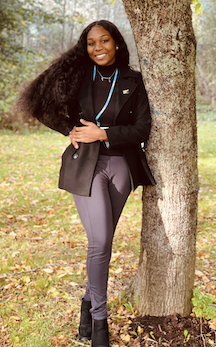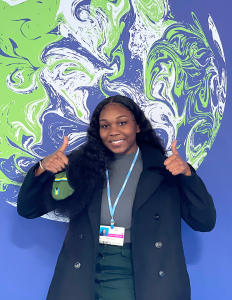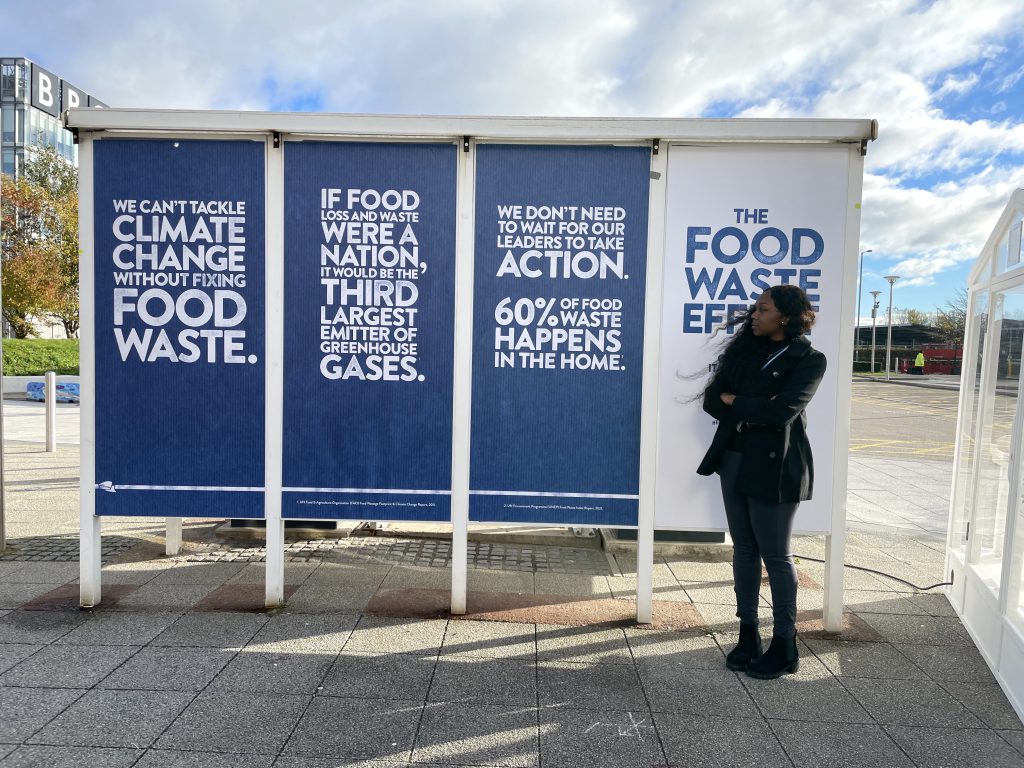
(photo provided)
Kariel Stuart, a third-year student majoring in interdisciplinary studies: environmental management in agriculture and natural resources, participated in the annual climate change conference in Glasgow, Scotland. The Freeport, Grand Bahama, native was nominated because of her past involvement in environmental issues and passion for the issues related to climate change. She has also seen what climate change has done to her island nation. Here is Kariel’s account of her week at the COP26 conference and what drives her to be involved in climate talks:
Hurricane Dorian
On September 1st, 2019, not even a full two weeks after I moved to Gainesville for University, my home was flooded and destroyed by Hurricane Dorian. We lost members of our community, we lost our hospital, our airport is still not fully up to code, and our infrastructure still has not been upgraded enough to withstand another storm like her. Dorian sat on top of my island for 41 hours at Category 5 wind speeds. I am very glad that my parents knew when to leave and find shelter, but my house was flooded and destroyed along with all the memories that were once there.
As much as I wanted to, I couldn’t go home right away, and honestly, I would have been more of a burden than of help to them. Another mouth to feed, and only saltwater was running through the taps for a long time, so I’d have been using the very little fresh water available at the time. Instead, from here, I ran fundraisers and assisted in food drives until I could go back during the Christmas and Spring Break. This was when I did oil spill water sampling and site cleanup, as a crude oil tank had spilled on the Eastern end of Grand Bahama Island during the storm.
Getting the Invitation

I was nominated to attend COP26 based on several factors. After graduating high school, I received a scholarship award from The Bahamas Ministry of Education. That being said, my studies in this field, and consistent involvement in community service, have not gone unnoticed.
In total, I have represented my country in the United Nations Headquarters three times. Once was representing my high school due to an invitation from The Ministry of Foreign Affairs. The following two times were for Model United Nations events.
I was told several people recommended me as Climate Change Youth Ambassador, and am truly grateful that the work I’ve done thus far has influenced the community enough to have made a notable impact. I realize the weight of this opportunity and plan to take full advantage of the amplified voice it gives not only me but the younger generation and all people on the frontlines of climate change.
Attending the Conference
On one hand, it’s been a beautiful experience. I was able to learn so much more about climate change and how it affects others. I’ve also been able to share my perspective and leave a shadow imprint on people from all over the world, making connections that will last a lifetime. On the other hand, it’s painful to hear these stories and extremely frustrating to know that we’ve been having this conversation on a UN platform since 1992– yet the situation continues to get worse.
One of the most impressionable interactions I had was with the Mayoress of Freetown in Sierra Leone. My impression of her speech at a panel event on Urban Informality & Inequality was unlike anything I’ve ever experienced. I was absolutely inspired by every word she spoke and it’s amazing how she was able to increase morale and implement methods that were convenient to the context of their situation.
Seminars I attended included proposals from the global assembly, ways to re-engineer the planet, enhancing our natural environment, impacts on the agricultural and aquatic scene, and in general speaking with our government officials about how Dorian affected me and the changes I would like to see in my own community. I was the youngest person present in the delegation, so my main concern was trying to convey the youth perspective and the fear it brings us being left behind with the worst of what’s to come.
Climate Change and The Bahamas
The Bahamas is one of the most at-risk nations in regards to the consequences of climate change. With sea levels predicted to rise to at least a meter by 2100, it leaves 80% of the total landmass at risk of being submerged. Our coastal ecosystems are also being detrimentally affected by multiple factors including, but not limited to, rising temperatures, clearing of land, and construction on beaches. Most small island developing nations are faced with similar threats because they need funds and the tourist industry is the most lucrative. So, what do we do? This is a cycle of poverty – a system in motion that will stay in motion without an opposing force.
As equally as we are at risk of erasure from climate change, we are a huge piece in resolving factors contributing to it. The nations facing the brunt of these issues are contributing the least to it. The Bahamas’ emissions equate to 0.001 percent of the total, but our coral reefs and forests act as carbon sinks and natural barriers from the impacts of storms and surges.
We are one of many nations that contribute more to the solution than we do to the problem. As our reefs diminish, they are more impaired and unable to continue absorbing carbon emissions for the planet. The Bahamas needs debt forgiveness and/or money to be able to repair the damages inflicted on our natural systems, as well as to erect structures with materials able to withstand the hurricanes that threaten us every year.
Small island developing nations are not in a position to maintain their resources because the immediate priority is finding money to put food on the tables, which brings the core issue back to needing industrialized countries to take accountability for their part in the issue. Our goals are for adaptation, mitigation, finance for loss and damages, and ultimately to find a plan for the longevity of our planet. By requesting funds and assistance, we’re not asking for charity, we’re asking for what we deserve. What we all deserve— a chance to see the future together.

COP26 Takeaways
To be able to hear the plans and perspectives of nations from all around the world was truly an eye-opening experience, that’s absolute. I was able to meet a lot of interesting people and was introduced to numerous possible solutions for adaptation and mitigation—both on a ground level and a political one. However, history rarely fails to repeat itself. This is not the first Conference of the Parties. This was not the first United Nations Conference on Climate Change. Headlines called this event our “Last Best Chance Against Climate Change” but the world has been vociferous of its climate-induced wounds for decades now and should continue to talk about ways to evade its danger and move forward.
I do think this conference gives hope for inciting conversation and increasing public engagement. We need more people to care if we want a real shot at meeting our climate change goals. Conferences like this one provide a large platform capable of showcasing more of the parts of the world we would never have been exposed to without it. COP26 was a chance for everyone to see how people are being affected beyond the lengths of our own personal experiences. Coverage is what is needed to connect human experiences to the tragedies we see on the news. It shows policymakers and large corporations the real extent of their carbon footprints. While some are beginning to acknowledge and make minimal changes, we need policy changes and funding towards this cause to be prioritized.
I’m not opposed to some degree of political involvement through my career. It may be needed, and I’m willing if that proves to be the case because policy change is crucial in the grand scheme of things. Changes cannot be made without education about the systems that prevent them, so experience in science politics may be a necessary factor. Still, my passion lies in doing ground-level work. Research and community service is my priority and I’d like to continue my studies at a graduate level after my gap year.
Sharing with UF students
I am being an advocate through Instagram! I’m working on creating another platform to spread awareness of these issues, but for now, I upload the most major of my career experiences to @karieldanaestuart on Instagram.
The more I study in this field, as I get to know more about the world and the different issues all of our nations face, I now have a passion to work towards preserving not only my nation but the entire world in any way I am able because it’s going to take all of us to restore things to balance. Everyone has a role to play.
While it’s taken some seriously discouraging moments to get here, I’m enjoying the road to figuring out what my role is. After graduating, I plan to take a gap year and get involved in environmental crisis response projects around the world. I’d then like to begin graduate-level studies, with my end goal being to start an Environmental Crisis Response and Research Center.
 0
0
